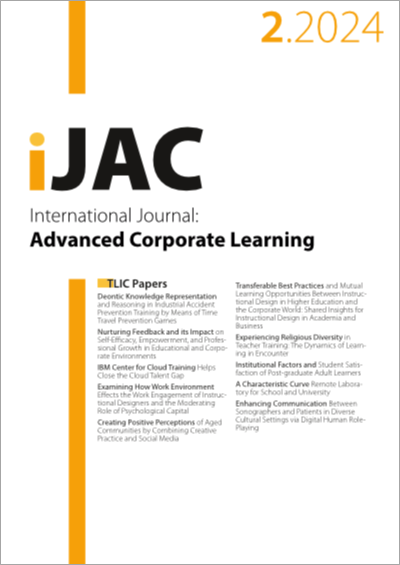A Characteristic Curve Remote Laboratory for School and University
DOI:
https://doi.org/10.3991/ijac.v17i2.45457Keywords:
remote laboratory, development of learning arrangements, probing ac-ceptance, tertiary education;Abstract
Remote laboratories play a pivotal role in facilitating teaching and learning experiences, offering unique opportunities beyond traditional classroom settings. The project OnLabEdu (Online Laboratories for School Education) aims the development of remote laboratories for both, schools and university-level students, complete with the development of appropriate accompanying educational resources. This paper introduces a characteristic curve remote laboratory with a first-developed learning arrangement on RGB LEDs and the interplay of energy, forward voltage, and wavelength of light. Drawing from the model of educational reconstruction, the learning arrangement is based on a profound clarification of the scientific content and considering students’ perspectives. Against the background of a design-based research approach, the learning arrangement was already evaluated with high school students through probing acceptance interviews. Now we are interested if the learning arrangement also fits to tertiary level students. Therefore, we conducted six probing acceptance interviews with pre-service teacher students, hailing from physics (n=3) and non-physics (n=3) backgrounds. The primary objective of the evaluation was to identify potential barriers to learning and elements that promote a stimulating learning environment along with the operation of the remote laboratory for the tertiary level. The findings revealed similar challenges of tertiary-level students and high school students. We detected students’ challenges with technical terminology as well as explaining the term forward voltage and its connection to the concept of energy. These results give initial ideas for a re-design of the learning arrangement to address the identified issues and make the learning arrangement suitable for tertiary level students.
Downloads
Published
How to Cite
Issue
Section
License
Copyright (c) 2024 Ingrid Krumphals, Thomas Benedikt Steinmetz, Christian Kreiter, Thomas Klinger

This work is licensed under a Creative Commons Attribution 4.0 International License.



